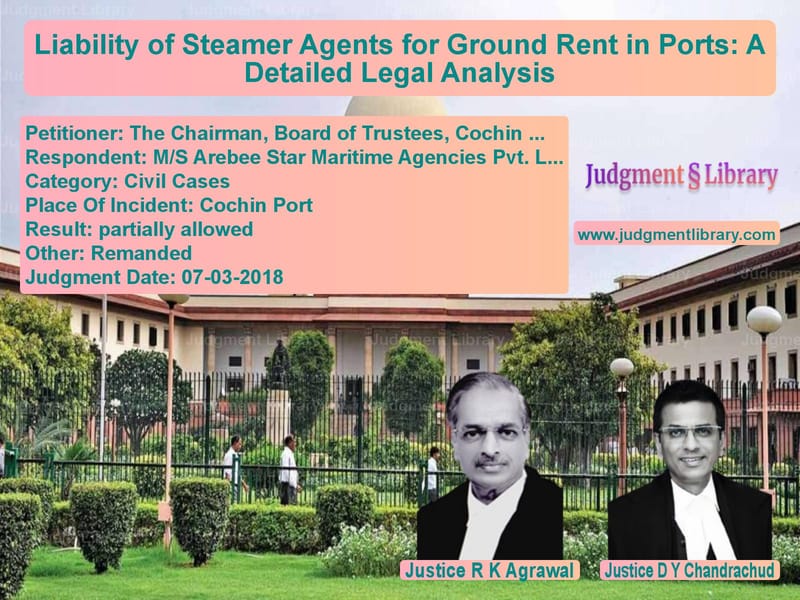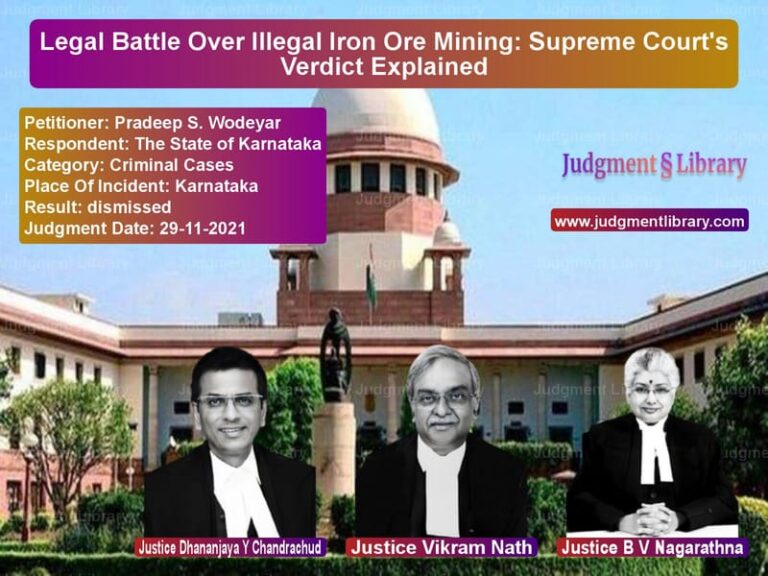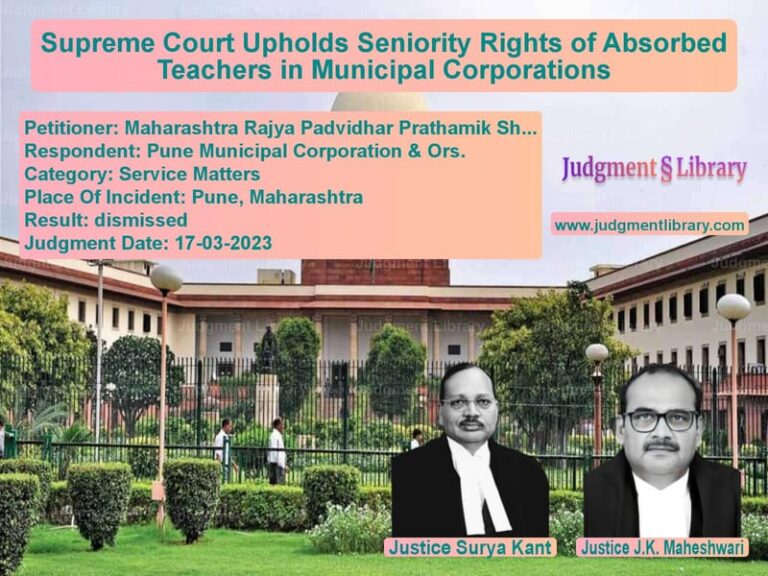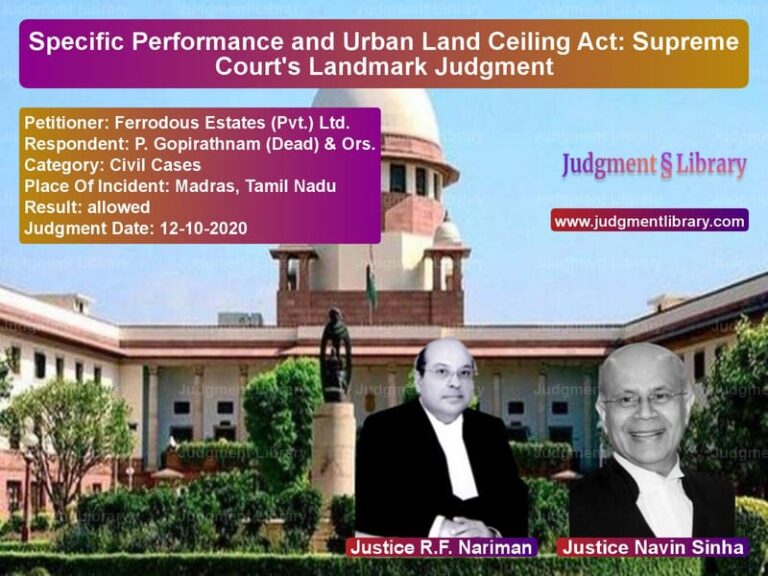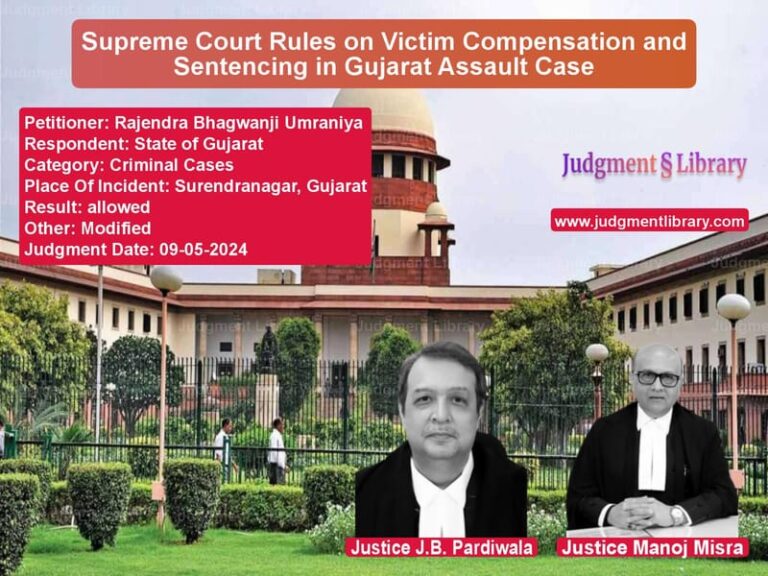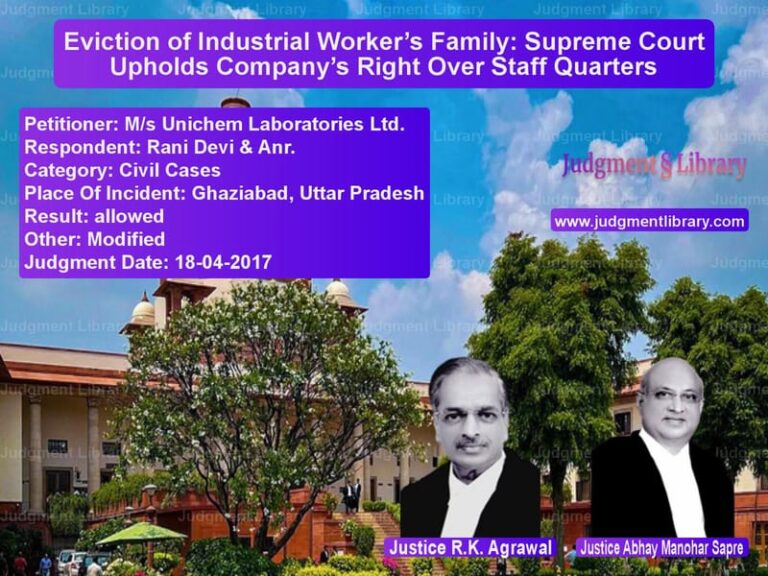Liability of Steamer Agents for Ground Rent in Ports: A Detailed Legal Analysis
The case of The Chairman, Board of Trustees, Cochin Port Trust v. M/S Arebee Star Maritime Agencies Pvt. Ltd. & Ors. presents a crucial legal issue concerning the liability of steamer agents for ground rent on containers unloaded at the Cochin Port. The dispute originated from the Kerala High Court’s ruling, which held that the liability to pay ground rent could not be imposed beyond the 75-day limit prescribed by the Tariff Authority of Major Ports (TAMP).
The matter revolves around the interpretation of the Major Port Trusts Act, 1963 (MPT Act), and the extent of responsibility of steamer agents in cases where cargo remains uncleared by consignees. Given the complexities involved, the Supreme Court found inconsistencies in previous judicial rulings and referred the matter to a larger bench for determination.
Background of the Dispute
The case traces back to incidents in 1998 when synthetic woollen rags were imported into the Cochin Port Trust premises. The containers were destuffed to facilitate customs examination, but the goods were not cleared due to objections by the customs department, which suspected that the consignment contained brand new clothes instead of old woollen rags.
As the consignees failed to clear the goods, they remained in the port premises for an extended period, leading to the accrual of ground rent charges. The Port Trust sought to recover these charges from the steamer agents, contending that they bore responsibility for the cargo until clearance.
Arguments by the Petitioner
The Chairman, Board of Trustees, Cochin Port Trust, presented the following arguments:
- The liability to pay ground rent should fall upon the steamer agents as they facilitated the cargo’s arrival and had control over its clearance process.
- The port had the authority under the MPT Act to levy storage charges and recover costs incurred due to uncleared cargo.
- Even though the consignees failed to clear the goods, the steamer agents should bear responsibility until final clearance.
- The interpretation of the relevant provisions of the MPT Act supports the port’s right to demand payment for storage beyond the TAMP-imposed 75-day limit.
Arguments by the Respondent
The respondents, mainly shipping agents, argued that:
- Once the cargo was unloaded, the responsibility for its clearance lay with the consignees/importers and not the steamer agents.
- The Bills of Lading Act clearly establishes that ownership and title of goods are transferred to the consignee, making them liable for all related charges.
- The steamer agents could not be held responsible for indefinite delays, especially when customs interventions contributed to the clearance issues.
- The TAMP-imposed 75-day limitation should be strictly enforced, and any further charges beyond this period should not be imposed on the steamer agents.
Judgment by the Kerala High Court
The Kerala High Court ruled in favor of the shipping agents, concluding that:
“The statutory framework does not impose any obligation on the steamer agents to ensure the clearance of goods from the port. Their liability is limited to the period before the cargo is officially handed over to the consignee or their representatives.”
The High Court held that the authority to impose storage charges rests with TAMP, and the Port Trust could only levy charges for a maximum of 75 days. It further stated that the steamer agents’ role in the clearance process ended once they facilitated the unloading of goods.
Supreme Court Analysis
When the matter reached the Supreme Court, the Court examined various past rulings, including:
- Rowther-I (1963) – Established that the Port Trust acts as a bailee for goods but does not assume ownership responsibilities.
- Rowther-II (1997) – Distinguished between liabilities before and after endorsement of the Bill of Lading.
- Forbes-I (2008) – Raised doubts about steamer agents’ liability and referred the issue to a larger bench.
- Forbes-II (2015) – Held that liability for storage charges could extend to steamer agents under certain conditions.
After reviewing these precedents, the Supreme Court identified inconsistencies and framed key legal questions requiring further examination:
- Does the transfer of title impact liability for storage charges under the MPT Act?
- Can a steamer agent be absolved of liability once a delivery order is issued?
- To what extent should a steamer agent be held responsible for charges on uncleared goods?
- What are the guiding principles for determining whether a Port Trust can recover charges from steamer agents or consignees?
Significance of the Case
This case has far-reaching implications for the shipping industry, particularly in defining the financial responsibilities of steamer agents and consignees in port operations. The Supreme Court’s decision to refer the matter to a larger bench underscores the need for a clear and consistent legal framework to govern such disputes.
Conclusion
The judgment will be pivotal in clarifying the obligations of shipping agents, consignees, and port authorities under the MPT Act. A definitive ruling by a larger bench will provide much-needed certainty in cases involving delayed cargo clearance and the imposition of ground rent charges.
Petitioner Name: The Chairman, Board of Trustees, Cochin Port TrustRespondent Name: M/S Arebee Star Maritime Agencies Pvt. Ltd. & Ors.Judgment By: Justice R K Agrawal, Justice D Y ChandrachudPlace Of Incident: Cochin PortJudgment Date: 07-03-2018
Don’t miss out on the full details! Download the complete judgment in PDF format below and gain valuable insights instantly!
Download Judgment: The Chairman, Board vs MS Arebee Star Mari Supreme Court of India Judgment Dated 07-03-2018.pdf
Direct Downlaod Judgment: Direct downlaod this Judgment
See all petitions in Contract Disputes
See all petitions in Property Disputes
See all petitions in Damages and Compensation
See all petitions in Judgment by R K Agrawal
See all petitions in Judgment by Dhananjaya Y Chandrachud
See all petitions in partially allowed
See all petitions in Remanded
See all petitions in supreme court of India judgments March 2018
See all petitions in 2018 judgments
See all posts in Civil Cases Category
See all allowed petitions in Civil Cases Category
See all Dismissed petitions in Civil Cases Category
See all partially allowed petitions in Civil Cases Category

